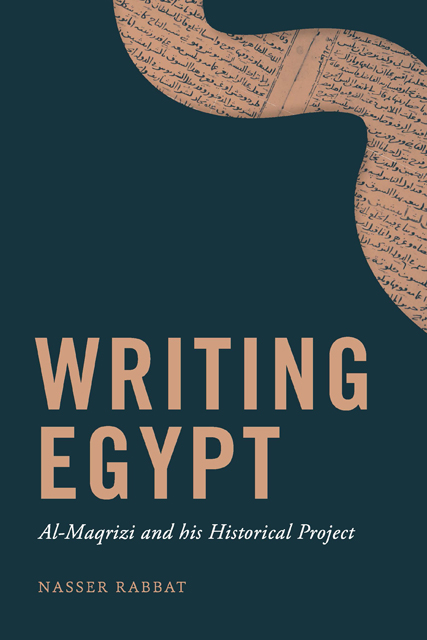Book contents
- Frontmatter
- Contents
- Preface
- List of Short References to Frequently Cited Primary Sources
- List of Abbreviations
- Notes on Transcription and Dates
- Introduction: A Singular Mamluk Historian
- Part 1 The Life of al-Maqrizi
- Part 2 The Writings of al-Maqrizi
- Part 3 The Afterlife of al-Maqrizi’s Writing
- In the Guise of a Conclusion: Becoming the Greatest Historian of Egypt
- Bibliography
- Index of Books Cited in the Text
- General Index
6 - Reading al-Maqrizi in Modern Egypt
Published online by Cambridge University Press: 02 June 2023
- Frontmatter
- Contents
- Preface
- List of Short References to Frequently Cited Primary Sources
- List of Abbreviations
- Notes on Transcription and Dates
- Introduction: A Singular Mamluk Historian
- Part 1 The Life of al-Maqrizi
- Part 2 The Writings of al-Maqrizi
- Part 3 The Afterlife of al-Maqrizi’s Writing
- In the Guise of a Conclusion: Becoming the Greatest Historian of Egypt
- Bibliography
- Index of Books Cited in the Text
- General Index
Summary
As a premier source for the urban history of Egypt, al-Maqrizi’s Khitat stood unrivaled for well over 400 years, a scholarly feat that would not be contested until the beginning of the nineteenth century with the appearance of the monumental Description de l’Égypte, ordered by Napoléon Bonaparte immediately after his army took Cairo in 1798. Only the Description was no real sequel to the literary Khitat tradition of medieval Egypt, although al-Maqrizi’s Khitat constituted one of its principal sources.It was instead an imposing herald of another intellectual tradition that will dominate the modern study of history: the empirical method of visual and textual documentation, archival research, and analysis. Following the model of Diderot’s and d’Alembert’s Encyclopédie, the Description de l’Égypte was the cumulative effort of more than a hundred and fifty scientists, scholars, engineers, and students recruited by Napoléon to accompany his expedition to Egypt (1798–1801). They systematically collected, studied, classified, and graphically represented everything known and knowable about Egypt, its geography and topography, its flora and fauna, its Pharaonic and Islamic patrimony as well as its contemporary conditions. The product of their labor was published in Paris between 1809 and 1828 after many difficulties in nine volumes of text and fourteen grand volumes of illustrations.A catalogue raisonné of prodigious proportions that formed the basis of the modern understanding of Egypt, the Description de l’Égypte was nonetheless a paradigmatic Enlightenment project both in its methods and in its epistemological principles of exhaustive coverage and scientific accuracy, as well as in its conjectures, biases, and goals. It brought back a sufficiently exhaustive and scientifically ordered body of knowledge about Ancient Egypt that helped establish and justify its foundational place in the history of Western civilization as we know it today. Conversely, it reinforced the prejudiced and negative opinions on the conditions of contemporary Egypt, and the whole “Orient” by extension, and presented nineteenth-century Europe with rationalized pretexts for intervention there on the eve of its grand colonial project.
In Egypt, the Napoleonic occupation had several long-lasting consequences despite its brevity.On the political level, it opened the way for the rise of the semi-independent and hugely ambitious regime of Muhammad ‘Ali Pasha (1805–48), who strove with varying degrees of success to carve an empire out of the Ottoman province he maneuvered to control.
- Type
- Chapter
- Information
- Writing EgyptAl-Maqrizi and his Historical Project, pp. 234 - 283Publisher: Edinburgh University PressPrint publication year: 2023

